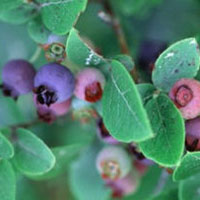Gluten Free
What does following a gluten-free diet mean? That you're embarking on an easy diet with a wide range of health-promoting effects. Instead of dwelling on what you’re giving up, consider that you’re going to enjoy a whole new world of delicious food options to meet your special dietary needs. You’ll be eating seasonally, choosing more fresh fruits and vegetables, focusing on meats, seafood, poultry, legumes, lentils, corn, and rice, and discovering fascinating ancient grains such as quinoa, amaranth, and millet. You’ll be able to eat potatoes, eggs, most cheeses, even chocolate (!)—and enjoy them without guilt because you’ll be taking good care of your body. In fact, you’ll probably end up eating—and feeling—better than ever!
Visit this page for more information about living Gluten Free
---
We carry a large variety of gluten free items, the brands listed below represent just some of the offerings we carry















More Diets
Blueberry
 © Steven Foster
© Steven FosterHow It Works
Tannins make up as much as 10% of blueberry leaves. The astringent nature of tannins likely accounts for the usefulness of blueberry leaf in treating diarrhea.2 The astringent effect may also be soothing for sore throats.3Bilberry, blueberry’s European cousin, is used primarily for maintaining blood vessels, particularly those in the eyes. Some preliminary evidence indicates that anthocyanosides, the bioflavonoid complex common to bilberrry and blueberry may help people with diabetes, particularly if they have damage to the retina (retinopathy). However, these studies are primarily based on a standardized extract from bilberry fruit.4
How to Use It
A tea is prepared by combining 1 cup (250 ml) boiling water and 1–2 teaspoons (5–10 grams) of dried leaves and steeping for 15 minutes. As many as 6 cups (1,500 ml) each day may be taken for diarrhea and 3 cups (750 ml) each day for diabetes. Alternatively, 1 teaspoon (5 ml) of tincture can also be used three times per day.
Copyright © 2026 TraceGains, Inc. All rights reserved.
Learn more about TraceGains, the company.
The information presented by TraceGains is for informational purposes only. It is based on scientific studies (human, animal, or in vitro), clinical experience, or traditional usage as cited in each article. The results reported may not necessarily occur in all individuals. Self-treatment is not recommended for life-threatening conditions that require medical treatment under a doctor's care. For many of the conditions discussed, treatment with prescription or over the counter medication is also available. Consult your doctor, practitioner, and/or pharmacist for any health problem and before using any supplements or before making any changes in prescribed medications. Information expires December 2026.









